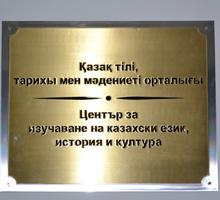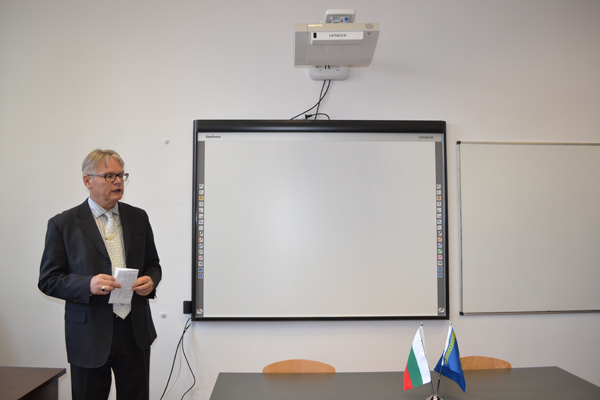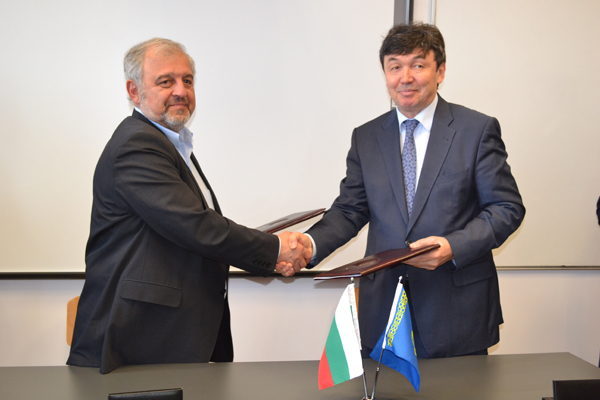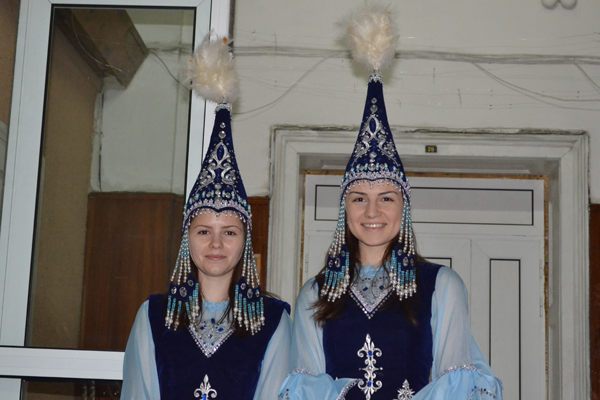
A Centre for the study of Kazakh language, history and culture was opened at the Centre for Eastern Languages and Studies at Sofia University “St. Kliment Ohridski”. During the ceremony a Memorandum for mutual understanding in the domain of culture, science, and education was signed between the diplomatic mission of the Republic of Kazakhstan to this country and Sofia University “St. Kliment Ohridski”.
The ceremony was attended by Prof. Dr. Habil. Ivan Ilchev, Rector of Sofia University, Prof. Dr. Tsvetan Teofanov, Dean of the Faculty of Classical and Modern Philology, Prof. Dr. Alexander Fedotov, Director of the Centre for Eastern languages and Studies, His Excellency Temirtay Izbastin, Ambassador of the Republic of Kazakhstan to this country, the ambassadors of Palestine, Vietnam, Belarus, Moldova, Georgia, representatives of the Russian Embassy, students, and faculty staff.
The event was opened by Prof. Dr. Alexander Fedotov. He welcomed the guests and pointed out that Kazakh language, Kazakh culture and Kazakh history have already been taught at the Centre for Eastern Languages and Studies. Says Prof. Fedotov, “This is a Centre that can definitely be called a Kazakh territory at Sofia University”. He recalled the fact that the discipline was originally introduced by the late Turkologist, Prof. Emil Boev.
Prof. Fedotov observed that due to the efforts of the diplomatic mission of the Republic of Kazakhstan, the Honorary Consulate of Kazakhstan to this country, and with the support of Sofia University and the Faculty of Classical and Contemporary Philology Lecture Theatre No. 27 has been renovated and equipped with up-to-date technologies so that lectures and seminars in Kazakh language, history and culture can be optimally conducted in it.
Recently the interest in Bulgaria in Kazakh language and culture has been markedly increasing and the relations between Bulgaria and Kazakhstan have been becoming more dynamic every year. Prof. Fedotov remarked that Sofia University is the only centre in this country that offers such a service – the teaching of the Kazakh language and the introduction of all those who want, not only students, to the culture and history of Kazakhstan.
After the signing of the Memorandum Prof. Ivan Ilchev, Rector of Sofia University, expressed his joy that Sofia University has become yet again the host of another centre dedicated to the study of language, history and culture.
“There may be people who would ask themselves whether a small country needs such a centre whose aim is to familiarize the intellectuals and the enlightened people with a distant country.” Although formally a historian the Rector compared the role of the university with the making of a highly condensed salt solution. Said Prof. Ilchev, “The ultimate goal of the university is to create the crystals of intellectual knowledge and curiosity.”
The Rector added that the cooperation between Alma mater and Kazakhstan has been developing quite efficiently. Since 2012 more than 70 Kazakh students have studied at Sofia University. Prof. Ilchev also mentioned that a publication of a translation of a history of Kazakhstan is being negotiated by the Publishing House of the University with a Kazakh historian. Such a publication will fill in a gap in this country and will be of interest to both historians and university students.
The Ambassador of the Republic of Kazakhstan to this country, His Excellency Temirtay Izbastin expressed his joy of having attended such a meeting and particularly the signing of such important documents. He stressed on the fact that the prehistory of the signing of these documents had been a long one: it took years to discuss the details so that the present ceremony would be made possible. His Excellency thanked the Rector of Sofia University for the efforts made to consolidate the cooperation between the two states and the opening of such a centre. Concluded Mr. Izbastin, “I can confidently state that this is the only centre of such a kind functioning in Central Europe today. Perhaps in the future there will be many centres in different countries, but today this is the only one.” He donated books and a traditional Kazakh robe to the Centre.





